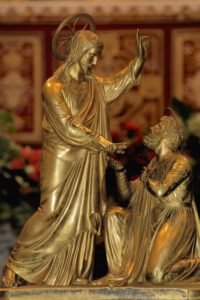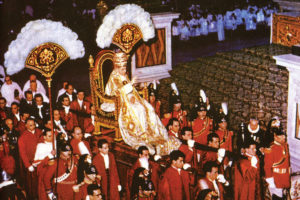
Since the hierarchical structure of the Church is a truth of the Faith, it is not surprising that the Popes uphold this teaching. A sampling of Papal declarations on this point illustrates the importance of this truth.
Old Condemned Heresies
In the fourteenth century, Marsilius of Padua, in his book Defensor Pacis (The Defender of Peace), erroneously maintained that all ecclesiastical power dwells in the Christian people and in the Emperor as their representative. This doctrine was condemned by Pope John XXII as “contrary to the Holy Scriptures, dangerous to the Catholic faith, heretical, and erroneous” and their authors as “undoubtedly heretics and even heresiarchs.”1
In the seventeenth century, Edmond Richer, in his De Ecclesiastica et Politica Potestate (On Ecclesiastical and Political Power) espoused the error that the fullness of ecclesiastical power resides in the Church as a whole, which then delegates this power to priests and bishops. Thus, the Pope would be merely the ministerial head of the Church and subject to the college of bishops.2
Errors of Gallicanism, Jansenism, and Febronianism
These doctrines were later echoed by Gallicanism3 and Jansenism4 and were further spread by Febronianism.
Regarding the latter, Friedrich Lauchert writes in the Catholic Encyclopedia:
Febronianism, the politico-ecclesiastical system outlined by Johann Nikolaus von Hontheim, Auxiliary Bishop of Trier, under the pseudonym Justinus Febronius…. He develops…a theory of ecclesiastical organization founded on a denial of the monarchical constitution of the Church. The ostensible purpose was to facilitate the reconciliation of the Protestant bodies with the Church by diminishing the power of the Holy See.5
Pope Clement XIII formally condemned these errors. In his turn, Pius VI also condemned them and struggled mightily against Febronianism. He placed Hontheim’s work on the Index of Forbidden Books, and in his letter Post Factum Tibi of February 2, 1782, to the Archbishop of Trier, Pius VI reaffirms: “It is, in fact, a dogma of faith that the authority of the bishops, even admitting that it stems directly from Christ, remains dependent on the authority of the Roman Pontiff.”6
Febronianism became widespread in Germanic countries under the protection of Emperor Joseph II. In 1782, Canon Joseph Valentin Eybel, a prominent leader of the Febronian current, wrote a libel titled Was ist der Papst? (What is the Pope?). The work rejected papal monarchy and advocated a republican form of government for the Church. In response, Pius VI, in the brief Super Soliditate of November 28, 1786, condemned the erroneous proposition “that Christ wished His Church to be governed in the manner of a republic.”7
What Does Saint Thomas Say About Immigration?
These republican theories about the Church are condemned as “containing propositions, respectively false, scandalous, bold, injurious, leading to schism, schismatic, erroneous, leading to heresy, heretical, and some condemned by the Church.”8
The Civil Constitution of the Clergy and the Jansenist Synod of Pistoia
Pius VI also condemned the Civil Constitution of the Clergy. Passed by the National Assembly of Revolutionary France, this decree applied liberal democratic principles to the Church. In the letter Quod aliquantum of March 10, 1791, Pius VI condemned the Constitution as schismatic and opposed to the Primacy of Peter.9
As the French Revolution reached a climax, Pius VI condemned the errors of the Jansenist Synod of Pistoia in 1794 in the celebrated constitution Auctorem fidei. That Synod called for establishment of a democratic system in the Church where power resided in the people—the faithful—who would then designate the Pope, bishops, and parish priests. This Papal document reads:
The proposition which states “that power has been given by God to the Church, that it might be communicated to the pastors who are its ministers for the salvation of souls”; if thus understood that the power of ecclesiastical ministry and of rule is derived from the community of the faithful to the pastors,—[is] heretical.10
Later, Gallican-Jansenist and liberal elements within the Church tried to prevent the definition of the dogmas of Papal Infallibility and Papal Primacy during the First Vatican Council (1869-1870). Their efforts came to naught. As seen, the dogma of the primacy is the foundation of the monarchic form of government in the Church.11
What does Saint Thomas Aquinas say about Marriage?

Pius XII: No Power in the Church Emanates From the People
Shortly after World War II, Pope Pius XII, in the Allocution to the Auditors of the Rota of October 2, 1945, again condemned the opinion that the Church must be transformed into some sort of democracy. Here are a few excerpts from the document.12 (The subtitles are ours.)
- Ecclesiastical Power Differs Essentially From Civil Power
If we consider the favorite thesis of democracy (a thesis constantly defended by great Christian thinkers)—that is, that the subject of political power that derives from God is, first and foremost, the people (not, indeed, the “masses”), the distinction between Church and State, even a democratic State, becomes ever clearer.… Ecclesiastical power is in fact essentially different from civil power. - The Origins of the Church, Unlike Those of Civil Society, Are Supernatural
The origin of the Church, unlike that of the State, does not arise from Natural Law…. The Church derives from a positive act of God which is beyond and above man’s social character but in perfect harmony with it. - Civil Society Grows From the Bottom Upward, While the Church Comes to Us From Above
This fundamental difference is manifest in one point above all. Unlike the foundation of the State, the foundation of the Church, as a society, was carried out not from below but from above. - Christ Did Not Impart His Mission as Master, Priest, and Shepherd to the Community
Christ Who, in His Church, has set up the Kingdom of God on earth which He announced and destined for all men and ages, did not hand on to the community of the faithful the mission as Master, Priest, and Shepherd which He received from the Father for the salvation of all men. He handed it on, rather, to a college of Apostles or envoys chosen by Himself so that they should, by their preaching, their priestly ministry, and their social power respectively, bring into the Church the multitude of the faithful in order to sanctify them, enlighten them, and lead them into full maturity as disciples of Christ. - The Basic Subject of Power in the Church Is Never the Community of the Faithful
In the Church, in contradistinction to the State, the basic subject of power and its ultimate manifestation, the supreme judge, is never the community of the faithful. There is thus no popular tribunal or judiciary power emanating from the people in the Church as founded by Christ, and there cannot be.
[like url=https://www.facebook.com/ReturnToOrder.org]
The Church Is a Hierarchical Society
According to Jesuit theologian Fr. Joachim Salaverri, the faithful must believe as a truth of the Faith that the Church is a hierarchical society and not a democracy:
That the Church, as an institution, is not a democratic society but a hierarchical one was defined by Pius VI against the Synod of Pistoia (Denzinger 1502); against the Protestants by the Council of Trent (Denzinger 960, 966); against the Modernists by Saint Pius X (Denzinger 2145, 3); and against innovators by Vatican Council I (Denzinger 1827s). Therefore, it can be called a defined truth of the faith.13
This article is a chapter of the book, I Have Weathered Other Storms: A Response to the Scandals and Democratic Reforms That Threaten the Catholic Church by the TFP Committee on American Issues.
1. L. Salembier, s.v. “Marsilius of Padua,” Catholic Encyclopedia (1913), Vol. IX, pp. 720. Cf. Denzinger nos. 495-498.
2. Cf. Pesch, Compendium Theologiae Dogmaticae, Vol. 1, no. 276.
3. “A complexus of theories developed in France, especially in the seventeenth century, which tended to restrict the authority of the Church regarding the State (Political Gallicanism) or the authority of the Pope regarding councils, bishops, and clergy (Ecclesiastico-Theological Gallicanism).” Parente, Piolanti, and Garofalo, Dictionary of Dogmatic Theology, p. 108.
4. The theological principles of Cornelius Jansen (1585-1638) emphasize predestination, deny free will, and maintain that human nature is incapable of good. The movement was characterized by general harshness and moral rigor. Its most famous exponent was Pascal. The movement received Papal condemnations (see Denzinger, no. 1291) and its adherents were persecuted in France (though tolerated in the Netherlands) during most of the eighteenth century. From the ecclesiological standpoint, the Jansenists defended democracy in the Church and subordination of the Church to the State (cf. Denzinger, no. 1502).
5. Friedrich Lauchert, s.v. “Febronianism,” Catholic Encyclopedia (1913), Vol. VI, p. 23.
6. The Monks of Solesmes, The Church: Papal Teachings (Boston: St. Paul Editions, 1980), p. 48.
7. Denzinger, no. 1500.
8. Denzinger, no. 1500, note 1.
9. Cf. The Monks of Solesmes, The Church: Papal Teachings, p. 67.
10. Denzinger, no. 1502. Emphasis in original.
11. Chapter 8.
12. Acta Apost. Sedis, 1945, pp. 256-62, quoted in Journet, The Church of the Word Incarnate, Vol. I, pp. 488-489.
13. Salaverri, De Ecclesia Christi, in VV.AA, Sacrae Theologiae Summa, Vol. I, no. 130.


